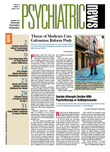No pharmacotherapy has been approved by the U.S. Food and Drug Administration (FDA) for the treatment of cocaine addiction. Cocaine dependence is usually associated with especially strong cravings, and those who try to quit have a high rate of relapse. Recent clinical data suggest, however, that two novel approaches may have an effect on reducing cravings and sustaining abstinence.
N-acetylcysteine is a precursor of cysteine, an amino acid, and acts on the cysteine-glutamate exchange mechanism. In the animal model for studying cocaine relapse, down-regulation of the cysteine-glutamate exchange is linked to increased cocaine-seeking behavior. N-acetylcysteine increases the activity of the cysteine-glutamate exchange and thus has attracted attention as a potential treatment for relapse-prevention in cocaine addiction.
A new study published in the July American Journal of Psychiatry examined the effect of N-acetylcysteine. The study was small—15 subjects with cocaine dependence participated in the double-blind, placebo-controlled, crossover study. Either N-acetylcysteine 600 mg or placebo was given every 12 hours for a total of four doses. The researchers showed the subjects four groups of slides as cues and measured their reactions, including vital signs; self-rated levels of craving for cocaine, desire to use cocaine, interest (measured by the question “How interesting is the picture?”); and the duration (in seconds) of viewing cocaine-related slides.
N-acetylcysteine was associated with a statistically significant decrease in three of the indicators—desire to use cocaine, interest, and time viewing cocaine-related slides, but the decrease in craving was not statistically significant.
Another potential treatment to enhance abstinence from cocaine use is an investigational vaccine designed to reduce the amount of cocaine in the blood before it enters the brain. This therapeutic vaccine, known as TA-CD, is currently being tested in phase 2 clinical trials. The vaccine works by stimulating the body to produce antibodies that “soak up” cocaine molecules in the blood stream and in turn blunt the high caused by the abundant cocaine molecules in the central nervous system.
In the clinical trials, multiple doses were given for three months to generate the desired amount of antibodies in the blood stream. Researchers hope the vaccine can help curb cravings and increase the likelihood of abstinence, perhaps as an adjunct to other treatment or interventions. Clinical trials on the efficacy and safety of TA-CD (owned by Celtic Pharma) are being funded by the National Institute on Drug Abuse and are ongoing. Results were presented in June 2007 at the annual meeting of the College of Problems of Drug Dependence.
